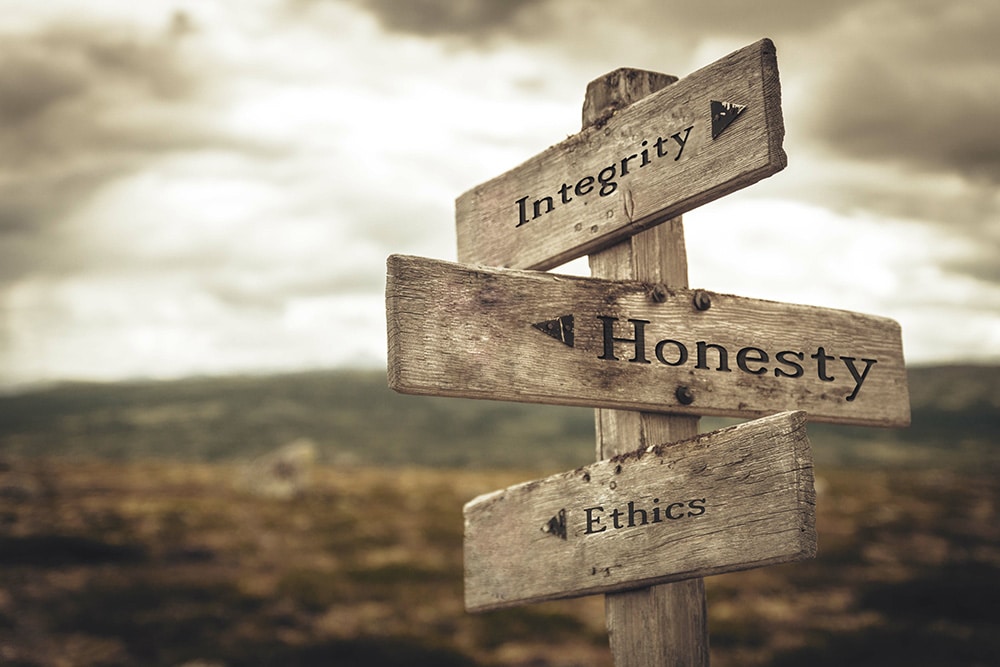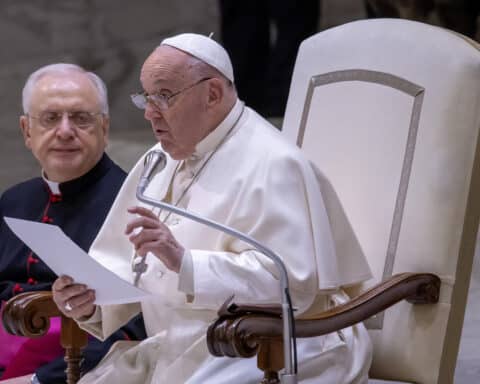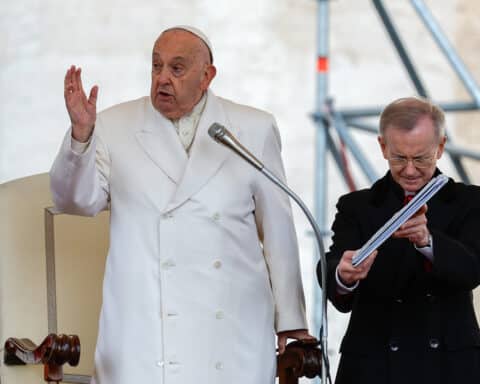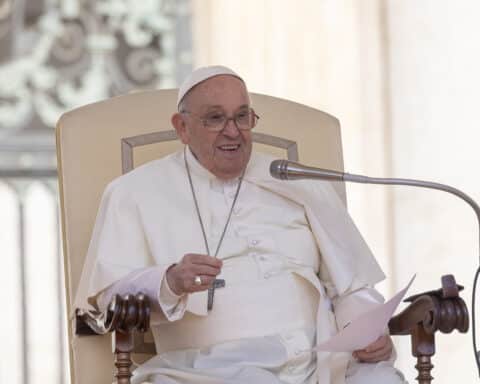What is truth? Pontius Pilate asked this question 2,000 years ago. My children ask it today.
With three kids, all younger than 10, virtues related to the truth come up frequently in our household. In a society in which mistrust and misrepresentation, both direct or indirect, are common, it is of utmost importance to foster a love and understanding of truth from a young age. Habits take time to build. Telling the truth in tough situations takes honesty and courage. Summoning that courage in difficult situations will be hard enough, so it’s best if full commitment to honesty is already established.
Archbishop Fulton J. Sheen said, “If you do not live what you believe, you will end up believing what you live.”
As a parent, I try to intentionally help my kids with this when the occasion arises. One such moment came recently when I heard a terrible ruckus upstairs. Pounding, rattling, laughing — my 8-year-old was goofing off, big time.
I called him down and asked what he was doing.
“Waiting for my turn on the computer.”
Manipulation or equivocation of wording to avoid consequences or to bring about a personal advantage begins very young, as children start testing the limits of language and truth. When I told my son that I didn’t think his choice of words accurately reflected what had been going on upstairs, he responded, “But it wasn’t a lie.”
“Perhaps not, my son, but you weren’t telling the truth either.”
The absence of a vice does not equate with the presence of virtue; honesty is not merely refraining from lying, just as love is not merely refraining from hatred.
It is essential for children to learn that it is not acceptable to use wording that, while not directly a lie, intentionally projects a false image. Accustoming themselves to the notion that such a response qualifies as an honest one sets a standard that allows them to deceive those to whom they speak and, ultimately, to deceive themselves. Once we stray from the path of truth, it gets harder and harder to work our way back. Telling the truth simplifies things.
Fyodor Dostoevsky in “The Brothers Karamazov” writes: “Above all, don’t lie to yourself. The man who lies to himself and listens to his own lie comes to a point that he cannot distinguish the truth within him, or around him, and so loses all respect for himself and for others. And having no respect he ceases to love.”
I used a technique that I had learned from my mother to help my son reflect on the truth of his words and whether they accurately represented his actions in that moment. I told him to draw two pictures: first, a picture of a child waiting for a turn on a computer, then a picture of what he had been doing upstairs. With the two pictures before us, it was easier to discuss with my son the meaning of his words. The exercise helped him visualize, in an objective manner, the discrepancy between the projected image he had given when asked, and the truth of what had gone on. Concretizing the meaning of what has been said helps demonstrate the interconnectedness between that which is, that which is known to be and that which is said to be. In short, it helps my kids be honest with themselves, which is the starting point for honesty with others.
Truth is a property of being, and therefore not a virtue in itself; behaving truthfully, however, is a virtue — or rather, several virtues. Honesty, sincerity and transparency are among the values that come together in truthful behavior and habits.
Honesty, the virtue we are most likely to associate with truth, emphasizes the direct alignment between what is, and what is conveyed. Hence, when one is honest, words, images, actions, etc., accurately reflect the reality they portend to portray.
French moralist and author François de La Rochefoucauld said, “Sincerity is an openness of heart; we find it in very few people; what we usually see is only an artful dissimulation to win the confidence of others.”
Sincerity comes from sincerus — pure, unadulterated. Sincerity refers to the inner alignment of who we are and how we act. It means being ourselves in a pure, undivided manner. Expressing ourselves sincerely, therefore, means that what we communicate about ourselves in word or by action, aligns with the truth of ourselves. Sincere kindness does not posture for something in return. Sincere words reflect one’s genuine feelings and beliefs, not simply what one thinks the other wants to hear.
Honesty and sincerity are both longstanding, common words in the Christian tradition; transparency, less so. Nonetheless, the notion of transparency has become an important factor in discussing truthfulness today. It focuses less on the alignment of what is said with what is, although it presumes that alignment to be in place. Rather, transparency deals with access to the truth. It combines honesty and justice — revealing the truth to those who have a right to know it.
Our commitment to these values and our personal credibility, applied collectively, becomes the trustworthiness and credibility of our communities. If we asked people whether they prefer truth to falsehood and trustworthiness to lack of credibility, no doubt all would value truth and credibility. But, when we take virtues for granted, we stop fighting for them and, in not fighting for them, we wind up losing them.
Sophocles said, “Far-stretching, endless time brings forth all hidden things and buries that which once did shine; the firm resolve falters, the sacred oath is shattered, and let none say, ‘It cannot happen here.'”
We exist as part of a truth that is bigger than us. When we personally stray from the truth in our own thoughts and actions, we fracture both the greater whole and our inner wholeness.
Our own undying commitment to living and speaking the truth makes a real difference. In a given moment, it’s a question of the truth or falsehood of one statement, perhaps, and the consequences that arise from it. But over time, it becomes a question of credibility and whether we can be expected to be true to ourselves.
Truthfulness is not, then, a game of words, but a profound commitment to integrity.
American poet E.E. Cummings said, “To be nobody but myself — in a world which is doing its best, night and day, to make me somebody else — means to fight the hardest battle any human can fight, and never stop fighting.”
Our own integrity is an extension of our coming forth from the being of God himself and his own integrity. We are in the image and likeness of “I Am”, and as such, are called to align our actions and words with the truth of our own being, with the truth of the world around us and ultimately, the truth of God himself.
Integrity involves the direction of our will toward the properties of being itself — the good, the true, the beautiful. When we stray from the truth, we ipso facto lose the good and the beautiful as well. Conversely, commitment to integrity brings with it an ever-greater communion with God, who is all Truth, all Goodness, all Beauty.
Jesus told us to be perfect as our heavenly Father is perfect. Telios, the Gospel term for this perfection, does not mean perfectionism or flawlessness. It means something more akin to integrity — being what one is meant to be. A being reaches perfection when it is fulfilling its essence, accomplishing what it is created for. Hence, a hammer is perfect in the act of hammering.
For the human person, this brings Jesus’ words into a meaningful paradigm. Telios is, therefore, not merely the act of being human in the generic sense, but more particularly, living the fullness of our own specific human experience, the individual call planted within our hearts that distinguishes each of us as a unique person sharing in God’s image and likeness. It is little wonder, then, that when speaking of each person’s call to be in union with the Father, Jesus speaks of truth: “I am the way and the truth and the life. No one comes to the Father except through Me.”
Quid est veritas? It is a question that has been answered many times, many ways. At the same time, it is a question that remains to be answered, and always will, because our own lives form part of that answer.
Ellen Mady writes from Pennsylvania.





